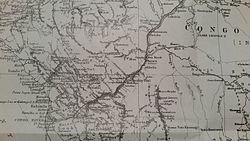Kingdom of Kakongo | |
|---|---|
| 15th century–1885 | |
| Royal banner (c. 1883) | |
 Henry Morton Stanley's map of the area during his expedition down the Congo River | |
| Capital | Kinguele |
| Common languages | Kikongo |
| Religion | Official:Bukongo Others:Roman Catholicism |
| Government | Monarchy |
| History | |
• Established | 15th century |
• Coast occupied by Portugal | 1883 |
• Incorporated into Portuguese Angola | 1885 |
Kakongo was a former small kingdom located on the Atlantic coast of Central Africa, in the modern-day Republic of Congo and Cabinda, Angola. It along with its southern neighbor, Ngoyo, and Loango, its neighbor on the north were important political commercial centers during the seventeenth through nineteenth centuries. The people speak a dialect of the Kikongo language and thus may be considered a part of the Bakongo ethnicity.
Early history
The earliest history of Kakongo is unknown, and oral traditions collected in the region in the nineteenth and twentieth centuries do not do much to elucidate the earliest history of the country.[1] In its present state, archaeology can only attest that the region was already in the Iron Age by the fifth century BC, and that complex societies were emerging in the general vicinity by the early centuries CE.
The kingdom is first mentioned in the titles of the King of Kongo Afonso I in 1535, in which he notes that he was king over this region, as well as a number of others located along the north bank of the Congo River.[2] This title has led historians to believe that Kakongo was once part of a federation of states that included Kongo and that may have formed as early as the late fourteenth century.
Kakongo was, however, an independent state for all intents and purposes from the sixteenth century onward. Portuguese merchants, interested in the trade in copper, ivory, and slaves began to establish factories in Kakongo in the 1620s and Dutch and English merchants also visited the kingdom during the seventeenth century. Its capital was called Kinguele, and was an inland town.
Commercial center
Kakongo became a very important commercial center in the eighteenth century, regularly visited by ships from England, France, the Netherlands, and Portugal. Its port of Cabinda was a major hub and lay in a protected bay. Slaves dominated the exports of the country, though most were simply transhipped from areas further south, both in the Kingdom of Kongo and the eastern provinces of Angola (such as Matamba). In 1775, French missionaries sought to convert the kingdom, along with its neighbors, to Christianity, hoping to reap the fruit of its long association with the neighboring, Christian, Kingdom of Kongo. The mission was largely unsuccessful, but did make contact with a community of Christians from Kongo's province of Soyo living at the town of Manguenzo in the interior. The mission was ultimately abandoned, however.
Notes
- ^ Phillipson, David W. (2005) African Archaeology (3rd edition) Cambridge University Press, Cambridge, England, page 295, ISBN 978-0-521-54002-5
- ^ Martin, Phyllis M. (1972) The external trade of the Loango Coast, 1576-1870: the effects of changing commercial relations on the Vili Kingdom of Loango Clarendon Press, Oxford, England, page 31, OCLC 635840790
.svg.gif)